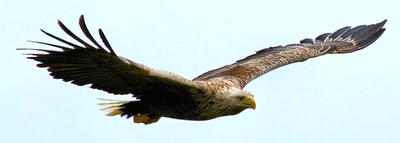
Sea Eagles could be reintroduced to Norfolk
Conservationists are planning to bring the sea eagle, the UK’s largest bird of prey, back to the skies above England.
The bird, known as “flying barn doors” because of its size, could be reintroduced into Norfolk next summer if the scheme gets the go-ahead. The government’s conservation agency Natural England, the RSPB and Anglian Water hope to bring back the species.
It was driven out of England more than 200 years ago and had disappeared from the UK by 1918. The plans come after the sea eagle, also known as the white-tailed eagle, was brought back to west Scotland in a project that began in 1975. There are now more than 40 breeding pairs in the area, with 34 chicks produced last year, and another scheme has begun in east Scotland.
Natural England’s chief scientist, Tom Tew, said returning the sea eagle to East Anglia would boost the local economy, put a top predator back in its natural place in the ecosystem and be “inspirational” for people.
On the Isle of Mull it has been estimated that the reintroduction of the birds bring in an extra £1.5m a year to the local economy.
Dr Tew said: “They are a magnificent bird and the UK’s rarest bird. Bringing them back would be inspirational to people and a boost for the local economy brought by eco-tourism. They are also the missing piece in the jigsaw, the top predator which should be in a wetland ecosystem.”
He said Norfolk had been assessed as the best place in England for releasing sea eagles, because it contained large areas of wetland habitat. And with only about 7,000 pairs of the eagle in the world, establishing a population in England could also help global efforts to conserve the species, Dr Tew added.
Rob Lucking, RSPB area manager for The Wash and North Norfolk, said: “The sight of birds of prey like the white-tailed eagle is a sure sign of a strong and healthy environment. Without them our ecosystem is disfigured, our natural and cultural heritage diminished and we are all the poorer. A re-introduction must be done properly and with due regard to the people and wildlife nearby but, if it can be done, then the sight of eagles soaring over Norfolk would give a huge lift to people’s spirits and to the local economy.”
Natural England and the RSPB are now keen to consult local people and landowners before deciding whether to attempt to reintroduce them elsewhere.








